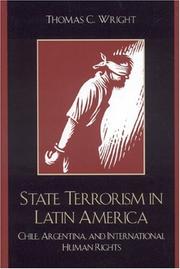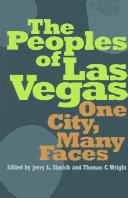| Listing 1 - 6 of 6 |
Sort by
|

ISBN: 1461642809 9781461642800 074253720X 9780742537200 0742537218 9780742537217 Year: 2007 Publisher: Lanham Rowman & Littlefield
Abstract | Keywords | Export | Availability | Bookmark
 Loading...
Loading...Choose an application
- Reference Manager
- EndNote
- RefWorks (Direct export to RefWorks)
This cogent book examines the tragic development and ultimate resolution of Latin America's human rights crisis of the 1970s and 1980s. Thomas Wright focuses especially on state terrorism in Chile under General Augusto Pinochet (1973-1990) and in Argentina during the Dirty War (1976-1983). He offers a nuanced exploration of the reciprocal relationship between Argentina and Chile and human rights movements, clearly demonstrating how state terrorism in these countries strengthened the international human rights lobby and how, in turn, that more powerful lobby ultimately helped bring repressors t
Book
ISBN: 0292759274 Year: 2014 Publisher: Austin : University of Texas Press,
Abstract | Keywords | Export | Availability | Bookmark
 Loading...
Loading...Choose an application
- Reference Manager
- EndNote
- RefWorks (Direct export to RefWorks)
Universal human rights standards were adopted in 1948, but in the 1970s and 1980s, violent dictatorships in Argentina and Chile flagrantly defied the new protocols. Chilean general Augusto Pinochet and the Argentine military employed state terrorism in their quest to eradicate Marxism and other forms of “subversion.” Pinochet constructed an iron shield of impunity for himself and the military in Chile, while in Argentina, military pressure resulted in laws preventing prosecution for past human rights violations. When democracy was reestablished in both countries by 1990, justice for crimes against humanity seemed beyond reach. Thomas C. Wright examines how persistent advocacy by domestic and international human rights groups, evolving legal environments, unanticipated events that impacted public opinion, and eventual changes in military leadership led to a situation unique in the world—the stripping of impunity not only from a select number of commanders of the repression but from all those involved in state terrorism in Chile and Argentina. This has resulted in trials conducted by national courts, without United Nations or executive branch direction, in which hundreds of former repressors have been convicted and many more are indicted or undergoing trial. Impunity, Human Rights, and Democracy draws on extensive research, including interviews, to trace the erosion and collapse of the former repressors’ impunity—a triumph for human rights advocates that has begun to inspire authorities in other Latin American countries, including Peru, Uruguay, Brazil, and Guatemala, to investigate past human rights violations and prosecute their perpetrators.
Impunity --- Human rights --- Democracy
Book
ISBN: 9780292759275 0292759274 9780292759268 0292759266 1477309829 Year: 2021 Publisher: Austin
Abstract | Keywords | Export | Availability | Bookmark
 Loading...
Loading...Choose an application
- Reference Manager
- EndNote
- RefWorks (Direct export to RefWorks)
Universal human rights standards were adopted in 1948, but in the 1970s and 1980s, violent dictatorships in Argentina and Chile flagrantly defied the new protocols. Chilean general Augusto Pinochet and the Argentine military employed state terrorism in their quest to eradicate Marxism and other forms of “subversion.” Pinochet constructed an iron shield of impunity for himself and the military in Chile, while in Argentina, military pressure resulted in laws preventing prosecution for past human rights violations. When democracy was reestablished in both countries by 1990, justice for crimes against humanity seemed beyond reach. Thomas C. Wright examines how persistent advocacy by domestic and international human rights groups, evolving legal environments, unanticipated events that impacted public opinion, and eventual changes in military leadership led to a situation unique in the world—the stripping of impunity not only from a select number of commanders of the repression but from all those involved in state terrorism in Chile and Argentina. This has resulted in trials conducted by national courts, without United Nations or executive branch direction, in which hundreds of former repressors have been convicted and many more are indicted or undergoing trial. Impunity, Human Rights, and Democracy draws on extensive research, including interviews, to trace the erosion and collapse of the former repressors’ impunity—a triumph for human rights advocates that has begun to inspire authorities in other Latin American countries, including Peru, Uruguay, Brazil, and Guatemala, to investigate past human rights violations and prosecute their perpetrators.
Impunity --- Human rights --- Democracy
Book
ISBN: 9798216109167 1440857687 Year: 2018 Publisher: Santa Barbara, California : Praeger,
Abstract | Keywords | Export | Availability | Bookmark
 Loading...
Loading...Choose an application
- Reference Manager
- EndNote
- RefWorks (Direct export to RefWorks)
This book covers the events of the Cuban Revolution itself, the resulting radicalization of Latin American politics, the United States' responses to the threat of communist expansion in the hemisphere, and rural and urban guerrilla warfare that were spawned by the Cuban Revolution.
Radicalism --- Violence --- History --- Latin America --- Cuba --- United States --- Politics and government --- Influence. --- Military policy.

ISBN: 0874176514 9780874176513 0874176166 9780874176162 087417614X 9780874176148 Year: 2005 Publisher: Reno University of Nevada Press
Abstract | Keywords | Export | Availability | Bookmark
 Loading...
Loading...Choose an application
- Reference Manager
- EndNote
- RefWorks (Direct export to RefWorks)
Cultural pluralism --- Ethnology --- Cultural diversity --- Diversity, Cultural --- Diversity, Religious --- Ethnic diversity --- Pluralism (Social sciences) --- Pluralism, Cultural --- Religious diversity --- Culture --- Cultural fusion --- Ethnicity --- Multiculturalism --- Cultural anthropology --- Ethnography --- Races of man --- Social anthropology --- Anthropology --- Human beings --- Las Vegas (Nev.) --- Las Vegas, Nev. --- City of Las Vegas (Nev.) --- Vegas (Nev.) --- Las-Veqas (Nev.) --- Горад Лас-Вегас (Nev.) --- Horad Las-Vehas (Nev.) --- Лас-Вегас (Nev.) --- Las-Vehas (Nev.) --- Naʼazhǫǫsh Hátsoh (Nev.) --- Λας Βέγκας (Nev.) --- Las Venkas (Nev.) --- Lasvegaso (Nev.) --- 라스베이거스 (Nev.) --- Lasŭ Peigŏsŭ (Nev.) --- 라스 베이거스 (Nev.) --- לאס וגאס (Nev.) --- Campi (Nev.) --- Lasvegasa (Nev.) --- Las Vegasas (Nev.) --- ラスベガス (Nev.) --- Rasu Begasu (Nev.) --- לאס וועגאס (Nev.) --- 拉斯维加斯 (Nev.) --- Lasi Weijiasi (Nev.) --- Lasiweijiasi (Nev.) --- Clark's Las Vegas Townsite (Las Vegas, Nev.) --- Ethnic relations. --- Population.
Book
ISBN: 0874178185 9780874178180 0874178177 9780874178173 Year: 2010 Publisher: Reno University of Nevada Press
Abstract | Keywords | Export | Availability | Bookmark
 Loading...
Loading...Choose an application
- Reference Manager
- EndNote
- RefWorks (Direct export to RefWorks)
Cultural pluralism --- Ethnology --- Minorities --- Immigrants --- Las Vegas (Nev.) --- Social conditions. --- Ethnic relations. --- Emigration and immigration.
| Listing 1 - 6 of 6 |
Sort by
|

 Search
Search Feedback
Feedback About UniCat
About UniCat  Help
Help News
News